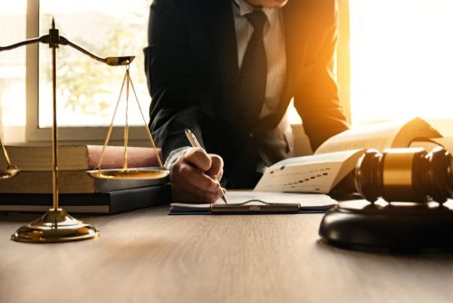Criminal prosecution is often one the most intimidating, yet attractive, areas of law. It is intimidating because the consequences of a criminal case can have a severe impact on the life of the accused. However, criminal cases are attractive due to the popularity of scripted and reality television shows depicting crime and courtroom drama. This often blurs the lines between fiction and reality. The facts of each criminal case are different, yet most criminal cases will follow these general concepts and procedures.
The different between a civil case a criminal case.
The civil and criminal processes are often confused. It would be helpful to explain the difference between these two areas of law. In a civil case, a complaint is brought by one person against another. For example, an injured driver can bring a complaint against an at-fault driver in a car accident. The injured party may then seek monetary damages from the at-fault driver. In a criminal case, the government will bring a complaint against a person. The complaint will allege that the person has committed a crime. The government may then ask the court to punish that person with a sentence of probation, time in jail, time in prison, or even death. Most criminal cases will start with an arrest by a law enforcement officer. In order to make an arrest, law enforcement must have “probable cause” to make the arrest. This means that law enforcement must see a crime being committed, or must have enough evidence that a crime has been committed, before making an arrest. It is important to note that law enforcement does not need probable cause to conduct a search.
Pre-Trial Proceedings.
A proceeding known as “arraignment” will follow the arrest. At arraignment, the court will formally inform the defendant of the crime of which he is being charged and the maximum penalty allowed. The defendant then has the option to plea guilty, not guilty, or no contest. No contest means that the defendant is not admitting quilt however, based on the circumstances, he believes that it is in his best interest not to contest that charge. If pleading not guilty, the defendant will have the option to represent himself, retain the service of public defender, or retain a private attorney. The defendant has a right to participate in “discovery” which means that he can obtain all evidence that the prosecuting attorneys possesses in the case. Once this discovery is obtained, the defendant, or his attorney, can better evaluate the merits of the case. During this time, certain motions may be filed on the defendant behalf. For example, a motion to suppress can be heard. A motion to suppress will ask the court to not allow evidence that was obtain by violating the defendant’s Fourth Amendment rights.
Jury Selection and Trial.
Every person has a right to a fair trial. If the defendant has not reached an amicable resolution with the prosecutor, he may elect to go to trial. Before the trial, the defendant will participate in selecting who will sit on the jury. This process is known as “jury selection.” Once jury selection is complete, the trial will begin. During the trial, the defendant does have to prove that he did not commit the crime. In fact, the defendant is not required to speak at his trial. It is the government who has the burden to prove “beyond every reasonable doubt” that the defendant committed the crime. The government will call witness and present evident to the jury. Once the government has presented all of its evidence, the defendant may then present evidence or call witness to cast doubt onto the government’s case. Once the jury has heard all evidence, the jury will make a decision based on the evidence they have heard. This decision is called a verdict. The verdict will either be guilt or not guilty.
Criminal accusations can be a stressing time for the accused and their family. It is highly advisable to consult with an attorney before making any agreements with criminal prosecutors. The attorneys at the Watson firm are experienced in assisting those who have been accused of crimes from arrest, through the discovery process, and through any pre-trial proceedings. Also, we are skilled in raising the reasonable doubt shield needed to avoid a guilty verdict at trial. If you or any one you know has been charge with a crime, we invite you to contact us for a free consultation.

